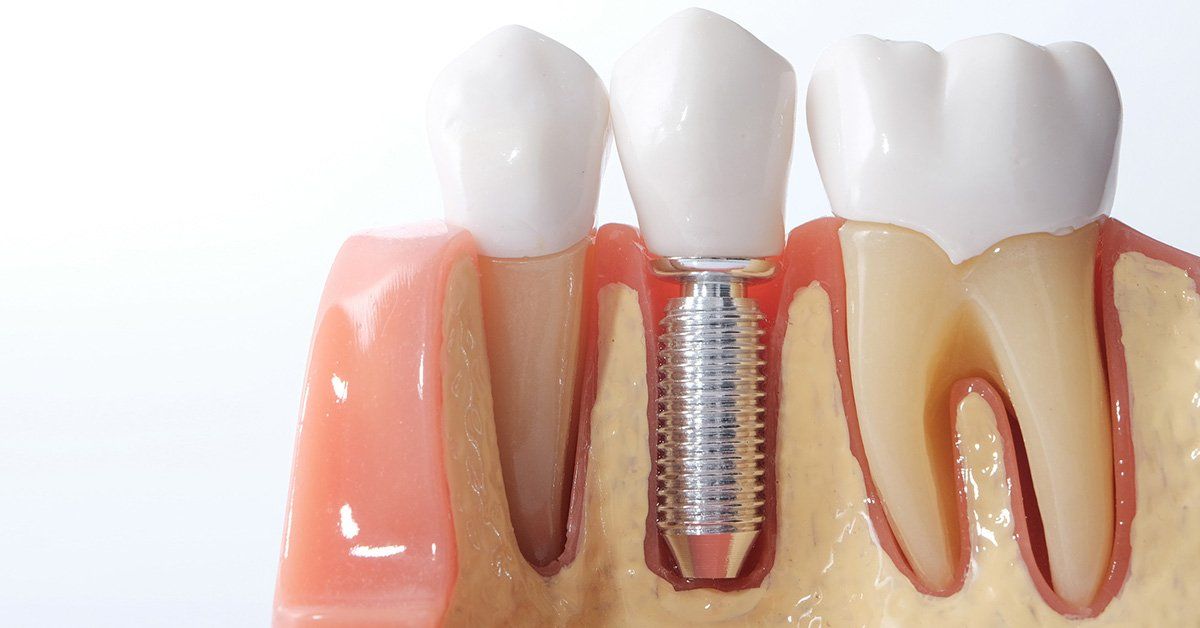Dental Implant Problems: What to Do When Your Dental Implants Cause You Pain
Dental implants are very necessary, and sometimes can they can cause minor problems. Learn about dental implant problems and what to do.
Are dental implant procedures safe?
While getting a implant is a pretty straightforward and low-risk surgery, there are still a few things that can go wrong. We've put together this guide to help you understand more about potential implant problems and what to do about them.
Before we get into these problems that can occur after your procedure, it's important to know you likely won't experience any of these issues. Dental implant surgeries have a 98% success rate , so you should get through the recovery process without any hiccups.
However, it's important to understand the potential problems so you can recognize them if they happen and know what to do next.
Here's a quick look at some of the most common dental implant problems.
Infection
Your mouth is full of bacteria. Because of this, you might develop an infection after the surgery. If you catch the dental implant infection signs early, you can take care of them quickly, and they won't cause you much pain.
The best way to avoid infections is to follow your dentist's instructions. If you don't listen to their advice, you'll put a strain on your implant, which can lead to an infection.Delayed Healing
There are a few different things that can delay the healing process after your dental implant procedure.
The first is, again, not following your dentist's recovery directions. Even if you don't develop an infection from not listening to your dentist, you will slow down the recovery, meaning you'll be in more pain for a longer amount of time.
There are also several medical conditions that can make the healing process slower than normal. For example, people with diabetes, cancer, gum diseases, or other illnesses will take longer to recover. This is also true for people who smoke or drink alcohol often.
Make sure you tell your dentist about any preexisting conditions in advance.
Loose Implant
Your dental implant may get loose during (or even after) the recovery process.
This usually happens if there isn't enough bone to support the implant. Your dentist may then have to remove the implant and do bone grafting to strengthen the area. If possible, your dentist will then give you a new implant.
Your implant may also become loose if it can't handle the amount of pressure you put on it. Again, this usually is the fault of the surrounding bone.
However, you shouldn't have to worry about this. Your dentist will be able to tell if you have enough bone for the implant in advance. If you don't, they can take care of the issue before they do the surgery.
Broken Implant
It's possible for your dental implant to break over time, especially if you put a lot of force on it. Depending on the extent of the damage, your dentist should be able to repair it.
You might also damage your implant if you grind your teeth at night. This grinding can wear away at the crown.
Implant Micromovements
It takes several weeks for your implant to fuse to your jawbone. If your implant moves out of place during this time, it can become unstable.
This can be a painful experience, and in most cases, your dentist will need to operate on you again to fix the problem.
Dental Implant Infection Signs
As we've already mentioned, you most likely won't experience any of these problems. The most common issue you can run into, though, is an infection, so it's important to keep an eye out for any dental implant infection signs.
Some of the most obvious include the following:
- Pain and swelling (this is normal for the first few days after the procedure, but if the pain and swelling continue for more than four days, something may have gone wrong)
- Fever
- Bleeding from the implant area
- Bad breath
- (or taste) you can't get rid of
- Loose implant
Make sure you get in touch with your dentist right away if you notice any of these infection signs. If left untreated, an infection can cause the entire implant to fail.
Why Do Dental Implant Problems Happen?
In most cases, problems only occur if you don't follow your dentist's instructions after surgery. As long as you stick to your dentist's advice, you should be fine.
However, implants do require surgery, and it's impossible to know the outcome of surgery, so matter how minor it is. Sometimes, things just go wrong.
But remember, dental implants have a 98% success rate. You most likely won't experience any of these problems.
FAQs About Dental Implants
If you're getting ready for an implant procedure, you may have a few questions about the process. These FAQs will help cross some of them off your list.
How Long Do Implants Take to Heal?
The exact answer to this question depends on your personal circumstances. Everyone's bodies heal at different rates. It will take several months for your implant to heal completely, but you won't notice much of this.
How Long Do Implants Last?
Dental implants can last a lifetime if you take care of them. At the very least, they'll last about 20 to 25 years.
Does Dental Implant Surgery Hurt?
You might experience some minor to moderate pain or discomfort during the recovery process. However, you shouldn't be in a lot of pain. After the first few days, your mouth will feel relatively normal.
What Should I Do If I'm in Pain?
Your dentist may give you a prescription medication to help with the pain. However, if you are in a lot of pain and the medication doesn't seem to be working, make sure you get in touch with them.
Getting Ready for Your Dental Implant Procedure
You should be able to get through the procedure and recovery process without any dental implant problems. If you do think something has gone wrong or if you're in a lot of pain, the best thing to do is talk to your dentist. They'll be able to either find and fix the problem or help with the pain.
But you won't experience any of these problems with Riverside Dental Care. Our practice in New York City, NY, provides quality dental implant services you can count on.
Ready to learn more? Don't hesitate to get in touch with us today!



